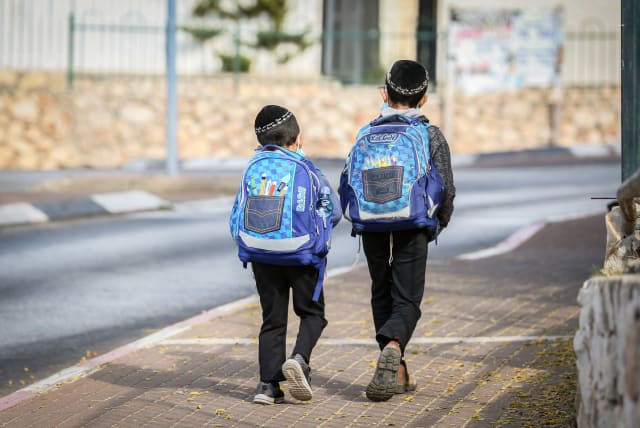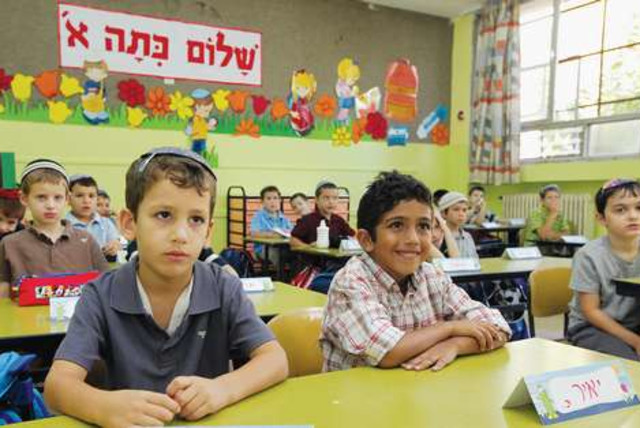How the Gaza war is affecting Israeli children - opinion

Trauma can have serious effects on us all, particularly on youth. Emunah is determined to ensure that Israel’s children and their families have the tools they need to heal.
While the world seems endlessly concerned with the plight of the children of Gaza, the effect of the war on Israeli children is largely ignored. A simple Google search will bring up countless articles about Gazan children’s trauma but very few NGOs or journalists are concerned with the effects of the current war on the mental health of Israeli children.
Although Israel has been through wars before, this one feels very different. The shock of the initial attack and the deep sense of national insecurity are being experienced by the whole country. Currently, many thousands of families are internally displaced and hundreds of thousands of children are living with only one parent at home, as reserves have been called up to the IDF. Rocket attacks and sirens remain a daily reality throughout Israel. When parents experience fear and uncertainty, children feel it and internalize it.
Israel is such a small country that few families can escape knowing someone who has been killed or seriously injured in this war. While adults struggle to understand their emotions of shock and grief, it is even harder for children to process the trauma.
Since October 7, Avi (not his real name) has been experiencing regular nightmares and is wetting the bed. He is 14 years old and was evacuated from Sderot after the devastating day that saw his community overrun by murderous terrorists. Although his immediate family is now physically safe, having been rehoused along with other families from Sderot in temporary accommodation, they are living with constant uncertainty; they have no idea when they can return home or what life will be like when they do. Living in Sderot, Avi’s family had almost grown used to the constant rocket barrages and having just 10 seconds to reach a safe room when the red alert sirens sounded. The current war, however, has created a new level of trauma. Every member of Avi’s family is suffering from the effects. Avi hasn’t been able to attend school, and he cannot concentrate enough to participate in Zoom lessons and is socially isolated from his friends. He is suffering from extreme anxiety, and his behavior has seriously regressed.
Before October 7, Avi was already attending regular therapy sessions at the Emunah Sarah Ronson Counseling Center in Sderot. This is one of 13 family counseling centers that Emunah operates throughout Israel, part of an extensive network of social welfare services that include daycare centers, five children’s homes, four high schools, a college, a women’s refuge, and two emergency shelters for children and teenage girls. Together, they support 10,000 children and families every day.
Emunah’s counseling centers are staffed by highly qualified professionals who offer almost totally subsidized counseling to children, adults, couples, and families. Emunah receives no government funds for these counseling centers, and the services rely on donations to keep running. These centers were already helping to support thousands of Israelis, and since the war, demand for their services has grown dramatically.
Psychological support and emotional first aid for children
Emunah is offering immediate psychological support and emotional first aid to children (and adults) affected by the war. While exposure to trauma can be life-changing, post-traumatic stress disorder (PTSD) is not inevitable if the correct help is given at the right time. Emunah is a first responder on the psychological frontlines of this war and will be there for the long term because healing is a process and therapy takes time and patience.
Avi is currently receiving emergency counseling over the telephone from his familiar therapist, and it is a virtual lifeline. The hope is that when he eventually returns home, he will be able to continue in-person therapy for as long as needed. His parents and siblings will also need significant therapy to support the psychological well-being of the whole family.
Trauma can have serious effects on us all, particularly on youth. Although the rest of the world may not care, Emunah is determined to ensure that Israel’s children and their families have the tools they need to heal so that they will come out of this war ready for new challenges and stronger and more resilient than before.
The writer is World Emunah interim director.
Jerusalem Post Store
`; document.getElementById("linkPremium").innerHTML = cont; var divWithLink = document.getElementById("premium-link"); if (divWithLink !== null && divWithLink !== 'undefined') { divWithLink.style.border = "solid 1px #cb0f3e"; divWithLink.style.textAlign = "center"; divWithLink.style.marginBottom = "15px"; divWithLink.style.marginTop = "15px"; divWithLink.style.width = "100%"; divWithLink.style.backgroundColor = "#122952"; divWithLink.style.color = "#ffffff"; divWithLink.style.lineHeight = "1.5"; } } (function (v, i) { });

